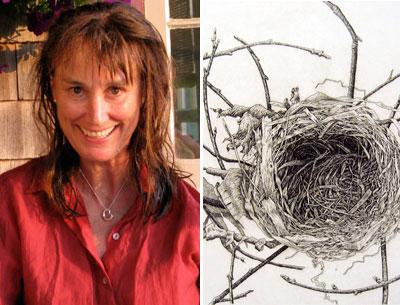An Island Life, Closely Observed

“Home Bird”
Laura Wainwright
Vineyard Stories, $19.95
In many aspects, Martha’s Vineyard, the sea-wind swept island off the coast of Massachusetts, presents a mirror to the South and North Forks. Geologically, we seem almost connected: low hills, salt ponds, rocky headlands, and sandy beaches.
This familiarity must have been part of what made Laura Wainwright, who spent much of her childhood in East Hampton, and whose family still lives here, choose to make the Vineyard her home.
She describes this moment of transition in her collection of essays, “Home Bird: Four Seasons on Martha’s Vineyard,” published this summer, when she and her husband, Whit Griswold, moved into a house that had been in his family. It was to be an experiment in living on the island full time. Her West Tisbury became like Gilbert White’s Selbourne, itself a collection of letters. Martha’s Vineyard for her is a place whose natural mysteries were a world unto themselves, worthy of a lifetime of exploration.
Much of the writing in “Home Bird” first appeared as columns in The Martha’s Vineyard Times, yet the stories seem as much letters to a friend as anything else. There is a closeness to them, revealing perhaps the focus with which Ms. Wainwright views her world. Illustrations by J. Ann Eldridge accompany each essay.
“Home Bird” is divided into four sections, starting with summer and swinging around the calendar. Some readers who know eastern Long Island, or really any of the coastal resorts, will find kinship with her sense that the year’s best months begin now, when the summer people have finally folded up their beach chairs and gone away.
“Except for the fishermen competing in the annual Striped Bass and Bluefish Derby, most of the summer boats and crowds are gone, and there’s a welcome sense of space,” she writes. Later in the year, when winter comes, she writes, “these stripped-down months are what keep me here. The short days hone something essential inside me. . . . The long nights, swirling with galaxies I can’t comprehend, challenge me and whet my appetite for spare simple truths.”
These are immediate thoughts; each of the essays in the book give the sense of having been written down at the end of the individual days they describe. Little moments predominate, like a swim at a freshwater inland pond on a hot summer’s day when the rest of the island is at the beach.
On a chance evening alone on the porch, she notices “the cottage next door is empty of its usual summer tenants. There are no sing-song voices playing hide and seek in the small yard. No screen doors bang. The grill sits unlit. The porch light is off. I notice three catbirds hopping along the low stone wall between our house and theirs. The undiluted quiet is a gift.”
It is such contemplative precision that gives “Home Bird” its charm. The title comes, Ms. Wainwright writes, from an Englishism for a person who prefers to remain close to the nest. In an essay of the same name, she pairs fall’s swarms of departing college students with male hummingbirds and “flocks of brown cowbirds and masses of emerald-backed tree swallows, which cluster up on the rainbow-colored edge of the Gay Head cliffs in preparation for their group migration.” It is a deft and accurate comparison.
The striking intimacy of “Home Bird” is present throughout. Writing about looking at the stars on a late-fall night, Ms. Wainwright almost confesses, “I love our watery planet so fiercely that I have to look away.”
Spring comes (perhaps too soon for the reader’s taste and the author’s) at the end of the short volume with an essay about an estate sale some years after an elderly friend’s death and one about how the guilty pleasure of feeding the birds resulted in a disaster of a rat warren and 10 or more skunks taking up residence in her basement.
“Home Bird” closes with the author’s recalling a walk in the woods as the native flowers began to bloom. “My step was light and my energy and focus were on what was right there in that moment. Full circle brought me back to the boardwalk across Duarte’s Pond and past the wild iris, but now I could savor them, with my feet firmly on the ground, spirits soaring.”
